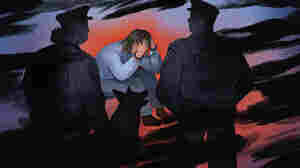The sun sets over the dark Manhattan skyline on August 14, 2003. A power outage affected large parts of the northeastern United States and Canada. Getty Images hide caption

Throughline
From NPR
The past is never past. Every headline has a history. Join us every week as we go back in time to understand the present. These are stories you can feel and sounds you can see from the moments that shaped our world.
Most Recent Episodes
A mugshot of Eugene V. Debs with his prisoner number in 1920. He was imprisoned in the Atlanta Federal Penitentiary for speaking out against the draft during World War I. The New York Public Library hide caption
Ayn Rand, Russian-born American novelist, is shown in Manhattan with the Grand Central Terminal building in background in 1962. ASSOCIATED PRESS hide caption
Thom Yorke, the singer of the British band Radiohead performs on the stage of the "Rock en Seine" music festival in 2006. AFP via Getty Images hide caption
Graffitied wall off Tahrir Square in downtown Cairo, Egypt, February 11, 2011. Egyptians celebrated minutes after former President Mubarak resigned from his presidential duties in the early evening on February 11 in Cairo, Egypt. Getty Images hide caption
A painting by artist Sidney King depicting a Dutch ship with 20 enslaved African people arriving at Point Comfort, VA in 1619, marking the beginning of slavery in America. Associated Press hide caption
Aerial view of one of the burst dikes on the Mississippi River, April 1927. ullstein bild via Getty Images hide caption









